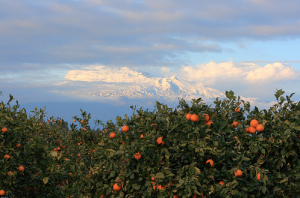By guest blogger, Natalie Donghia
Welcome to Catania, Land of Citrus and Volcanoes
Change is not always the most pleasant of things. Whether we decide to welcome it or loathe it, however, it remains a constant, a cliché.
I have always been a firm believer in the mantra, “when life gives you lemons, make lemonade.” I have even tailored the expression more thoroughly to suit my particular point of view: when life gives you (insert any ill or misery in this space), make lemonade. The saying connotes a certain approach to the unexpected, an outlook to living one’s life zestfully, indeed, a lifestyle. And as a born and bred Florida girl, do I ever love citrus.
A period of my life gives me pause, illuminating the moment I learned not only to accept change, but even, to welcome it.
In this particular chapter, I found myself in Catania, Sicily, engaged to begin a semester of study at the Università degli Studi di Catania. I arrived in Sicily with little of the amenities accorded me in my prior existence stateside – no flanking family members, no ostensible ties to the many cultural nuances of that magical island, and a limited means of expression, meaning my devoted, yet fretful and frustrating relationship with the Italian language.
Catania, as I was about to learn, is a land of surprises, signifiers and idiosyncracies. Located beneath the querulous maw of an active volcano, Mt. Etna, Catania spreads out towards the irascible current of the Ionian Sea in full, timeworn defiance. The people of Catania seem to be made of the very stuff of that volcanic earth: they are of passionate, capricious, argumentative and social temperaments. They are also among the most generous people I have had the pleasure to meet.
I have written at length about this season in Catania, in a collection of essays that goes by the name Delectable Catania:
“Catania begins with the scent of fresh lemons. I have given up trying to explain it in more sophisticated terms. To me it will always have that color, that scent. It will radiate a quintessentially Mediterranean warmth. I will think “Catania” and see a smoldering ochre flame. Lemons will always conjure up a season of dissimilar Catanias.”
I can only start to unearth the mysteries of Catania through its culinary eccentricities: the otherworldly gleam of carne di cavallo and tripe in the open-air markets; the marmoreal quality of fresh swordfish and tuna fillets; the saccharine escape provided in form of its multifarious pastries, cassate, marzipan, and cannoli; the syrupy tartness of citrus soda concoctions crafted by the ingenuous hands of street vendors in their kiosks. Catania, transfigured from the ashy facades of its palazzos, becomes a pleasuredome for the senses.
As I uncovered more of an island nation and its cultural heritage, dish by dish, I slowly discovered more about myself. An individual identity began to emerge. A language, no longer estranged, rolled effortlessly off my tongue: due kili di fragole; una fette di pesce spada; dei carciofi e delle ulive; arancini al ragù; le nespole (da non dimenticare).
Catania taught me to welcome change. Although we cannot always plan to expect the unexpected, we can act accordingly when we find ourselves in those unsure territories.
In Catania, each day, subject to the geological inconstancy of an uncontrollable volcano, is imbued with the promise of a newborn – as it could very well be the last. And yet, the Catanesi carry on with their lives and affairs regardless of the fact – markets bustle with commerce, universities swell with students.
The Catanesi seem to have perfected the fine art of making lemonade, when given lemons. As previously noted, their hand-crafted citrus sodas, such as the mandarino al limone, excel far beyond our flat fantas and insipid orange krushes. There is simply no comparison. I have channeled the spirit of these spritely sodas in the following recipe for aranciata. It is not quite the same thing, but has the effervescence and integrity of the original.
N.D. Homeade Aranciata – Aranciata di Agrumi
Makes 4-6 glasses, approximately
2 navel or Valencia oranges
2 clementines or tangerines (blood orange optional and recommended, if in season)
2 lemons
2 quarts sparkling water (more or less to taste, depending on how dense you prefer it)
2 sprigs mint, stem and leaves included
Juice the oranges, clementines and 1 ½ of the lemons (reserve the other half of lemon and cut for garnish). Pour the three citrus juices into a medium-sized pitcher. Add the sparkling water and stir well to blend the liquid. On a cutting board or other hard surface, “bruise” the sprigs of mint by crushing the stems and leaves with the flat side of a cutting knife to release the mint essence. Add stalks to the pitcher and let chill in the fridge. Stir well prior to serving and garnish glasses with lemon slices if desired.

